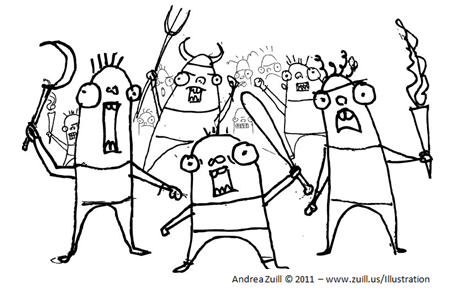Several people have asked about how we chose the name “Mob Programming” for our practice.
Here is my memory of it:
It seems we naturally give names to anything nameable
Once we started working using this practice, we found ourselves wanting to call it something. We started calling it different things: Crowd programming, Pair ++, Team Programming, Teaming, Mobbing, and Mob Programming are the ones I remember. I imagine there were others.
We searched on Crowd Programming and found it had a different meaning already, and nobody really liked this anyway.
Pair ++ didn’t catch hold with the team at all. Ppp? I don’t know. Not really how we think of it, I suppose.
Team Programming is how I think of our practice, but we didn’t use this much. I think of this as a “Whole Team Approach” to writing code.
Once we started calling it “Mobbing”, it just felt right.
Mob Programming stuck
Mob Programming quickly became our term of choice. We would say “Let’s mob on that”, or “we’ve been mobbing”, or “let’s schedule a mobbing room”.
I’m not sure exactly how we started using this term, but it had been in our vocabulary for a long time. For 4 or so years, while facilitating Coding Dojos at varoius code camps, Agile Open Space events, and user groups I’ve often explained that what we were going to do was “like pair programming, but with a mob”. This seemed to be something everyone could understand so I just kept using it.
Once we landed on this term, we searched on it and found the use of “Mob Programming” in the Extreme Programming Perspectives book (By: Michele Marchesi; Giancarlo Succi; Don Wells; Laurie Williams – Publisher: Addison-Wesley Professional) which has a very short description of a similar practice. So, we aren’t claiming to have invented the term. But it seems to work nicely for us and we are sticking with it for now. Heck, I’ve paid for the URL, so we better stick with it, I suppose.
I have documentation!
Looking back through my calendar, it was early October 2011 that “Mob” replaced all other terms in our reservations for meeting rooms where we could work. At that time, we didn’t have our own working area where we could all work together so we were reserving meeting rooms, traning rooms, or whatever was available in large enough time-blocks to be useful.
How wonderful to be part of an age-old tradition
I like to think of it as in the age-old traditional image of a mob: With pitchforks and torches chasing down evil, or at least chasing down something that we all are willing to agree is evil (for the time being, until we are shown that we were teribbly, teribbly wrong).
